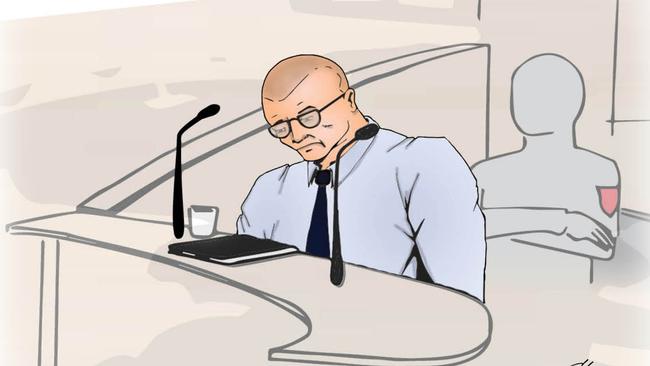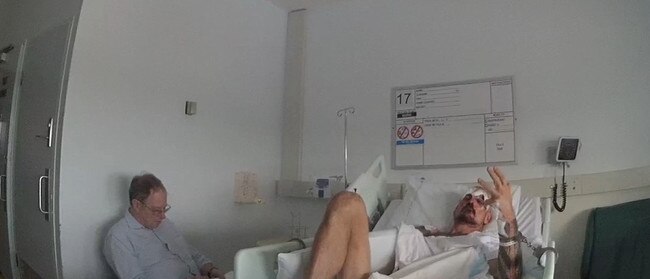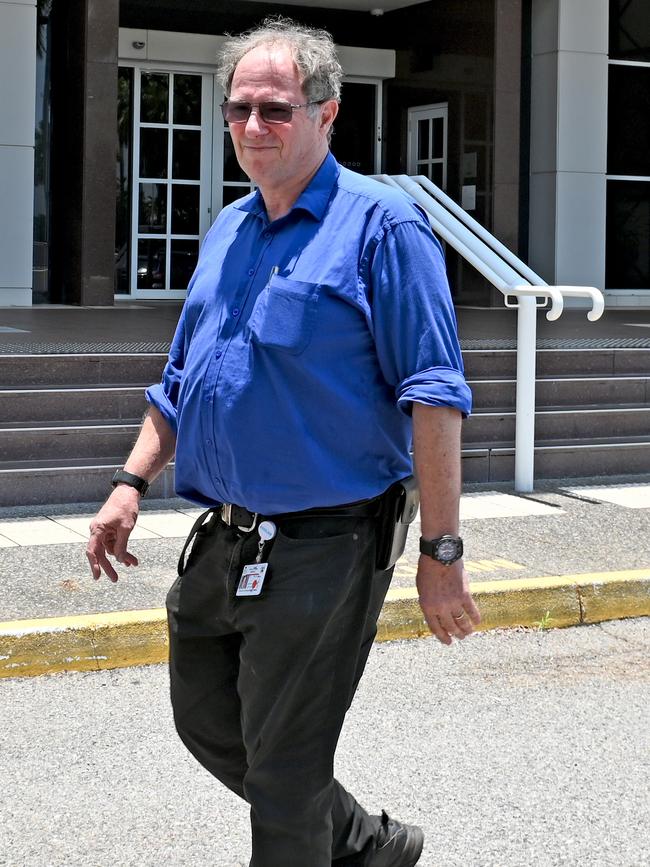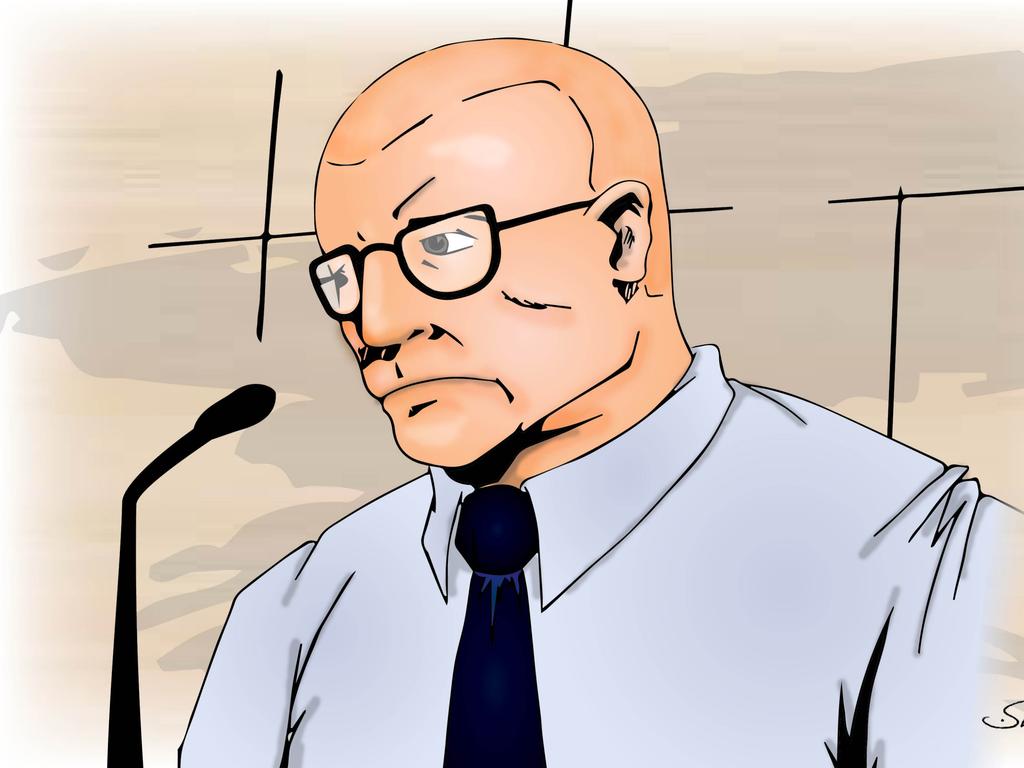Alleged gunman Ben Hoffmann asked for schizophrenia definition before claiming to hear voices
ALLEGED Darwin shooter Ben Hoffmann told a social worker he was “furious” and had “sticking up for my friend” on the night he allegedly gunned down four men in June 2019, a court has heard.

Northern Territory
Don't miss out on the headlines from Northern Territory. Followed categories will be added to My News.
THURSDAY AFTERNOON UPDATE:
ALLEGED Darwin shooter Ben Hoffmann told a social worker he was “furious” and “sticking up for my friend” on the night he allegedly gunned down four men in June 2019, a court has heard.
On Thursday, mental health social worker Kym Friese told Hoffmann’s murder trial she first spoke to Hoffmann in the days after the alleged rampage when he admitted to her that he “may have got the wrong people”.
“I asked him ‘Do you think that your actions would have been appropriate had you got the right people?’,” she said.
“(He said) ‘No miss, it would still make it wrong but at least it would be the right people.”
A couple of weeks later on June 24, Ms Friese said she again met with Hoffmann who told her he had “written down a few things” that he “wanted to share” with her.
“I had a complete mind blank, I was furious about what happened to me that night and what happened to my friend or what continues to happen,” she said he told her.
“I acted on a suspicion, I might have had the wrong addresses, there might have been innocent people involved that night - although I went to the right addresses they might have been innocent people.”
In their next meeting a few days later, Ms Friese said Hoffmann complained that “police and mental health services” had failed to help his “girlfriend” when she needed it.
“I had to help her and fix the injustice of what was done to her,” she said he told her.
“Where were the police? Where were her support? I was pushed by inaction to others to punish those who did this to her, but nobody will admit their part because they didn’t give me the help I needed and look what happened.”
Ms Friese said her next meeting with Hoffmann was about a month later and was called after he reported “hearing voices and seeing things”.
“(He said) he was experiencing visual hallucinations - one in particular bothered him whereby he claims that he witnessed plasma oozing out of a bread roll he was eating,” she said.
“He claims objects he is looking at will turn into faces, an example being ‘When I’m looking out that window Kym and Sophie, see that light, well it turns into a skull and crossbones’.”
It was in their final meeting in August that Ms Friese said Hoffmann told her he had been “sticking up for my friend”.
“He said he felt that he ‘deteriorated into someone who was going to retaliate’,” she said.
“When questioned how he was feeling about his actions he said that he was ‘embarrassed’ and ‘I wonder if I deserved any of this, but what was I supposed to do?’.”
The trial continues on Tuesday.

THURSDAY MORNING UPDATE:
ALLEGED Darwin gunman Ben Hoffmann asked another prisoner to “look up schizophrenia in the dictionary” before claiming to hear voices following his arrest for the murder of four men in June 2019, a court has heard.
In giving evidence in Hoffmann’s trial on Thursday, Top End Mental Health Service director of psychiatry, Rob Parker, told jurors he interviewed the accused killer several times after his arrest, including in late July.
In that meeting, Dr Parker said Hoffmann told him he was hearing voices and wanted to be “fully medicated” but admitted the voices would disappear when he was engaged in other activities which Dr Parker said was not consistent with a diagnosis of schizophrenia.
“Psychosis is a bit like a brushfire, once it occurs it’s very difficult to extinguish and it usually goes on for a couple of days so voices just don’t come and go,” he said.
“When someone’s got a good psychotic condition there’s usually intense psychotic phenomenon for a couple of days, it just doesn’t stop and start.”
Under questioning by Crown prosecutor Lloyd Babb SC, Dr Parker said he did not consider whether Hoffmann was “malingering or feigning” mental illness at the time but said it was still “fairly clear that he wasn’t psychotic”.
Dr Parker told Mr Babb he wasn’t aware at the time that Hoffmann had told another man “that he got another prisoner to look up schizophrenia in the dictionary and said ‘hallucinations, voices, I had this last week’”.
But Dr Parker said while it may be commonly believed that “when you hear voices you’re psychotic”, psychiatrists took a more nuanced approach when making a diagnosis.
“Just the voices themselves aren’t typical of psychosis, although the common public may believe that,” he said.

“Most people usually associate psychosis with hallucinations but they don’t recognise the other features which allow us as psychiatrists to determine whether someone is psychotic or malingering.
“Ben might have been told hallucinations by themselves might have been it (but) with our specific questions about thought broadcasting, thought insertion, referential delusions and observations of his mental state during that interview it was fairly clear that he wasn’t psychotic.”
The court heard Dr Parker had previously treated Hoffmann after he was sectioned under the Mental Health Act in 2009 after his mother reported he had climbed onto the roof in the middle of the night, yelling and screaming and had “set up booby traps around the house and yard”.
But Dr Parker said while Hoffmann had an antisocial personality disorder there was no indication he was suffering from mental illness at the time and he was discharged the following day.
“An antisocial personality is someone who has pervasive constant difficulty in maintaining a normal presence in society,” he said.
“It’s pervasive difficulties, constant difficulties that are disabling in basically being a normal human being in the community, so difficulties in work, difficulties in social relationships, difficulties in interaction with the law.”
Hoffmann’s barrister, Jon Tippett QC, pointed out his client had also reportedly believed at the time that his partner had “left him for a Muslim man”, who was also called Ben and that her mother had paid a hitman to kill him.
But Dr Parker said those beliefs weren’t enough to pass the “specialist pub test for delusions” - in contrast to evidence he had given at an inquest into the murder of police officer Glen Huitson by Rodney Ansell two decades before the shootings.
Dr Parker said it was quite common for people with antisocial personality disorder to get “ideas that they mix in dangerous company and as a result things are about to happen to them” but that wasn’t the same as Ansell’s belief that “bikies were going to kill him because a blade of grass was at 45 degrees rather than 35 degrees”
“He had a delusion that the freemasons were committing child sacrifices and as result of that he had to go and kill people so there was actually a fantastic aspect to his ideation at that time,” he said.
“If (Hoffmann) told me that the blade of grass was at 45 degrees rather than 35 degrees and therefore the bikies were going to kill him I would have thought that would have reached the level of delusion, but the fact that someone with an antisocial personality reports that bikies are going to kill him - we’re hearing that every second week from people with similar personalities.”
Hoffmann has pleaded not guilty to all charges including the murders of Hassan Baydoun, Nigel Hellings, Michael Sisois and Rob Courtney. His trial continues.
EARLIER UPDATE: ACCUSED Darwin gunman Ben Hoffmann had up to 18 times the clinical dose and almost three times the usual recreational dose of methamphetamine in his blood on the night he allegedly shot dead four men in 2019, a court has heard.
Hoffmann’s murder trial resumed in the Supreme Court on Wednesday where forensic physician, Angela Sungalia, told jurors Hoffmann’s reading of between 0.77 and 0.89 mg/L was “very much” in the high range for recreational use.
Dr Sungalia told the court while methamphetamine, or ice, primarily caused a surge in euphoria, the adverse effects including aggression and disinhibition “overwhelm the positive effects”.
“That’s seen very commonly in people that do come up against the law on methylamphetamine, whether it’s driving or other behaviours, that they become disinhibited,” she said.
“They become overconfident, perhaps grandiose, feeling that they can do anything, feeling that they can’t be hurt.”
Dr Sungalia said the level of meth in Hoffmann’s blood would have been “high” during a traffic stop earlier on the day of the killings when he appeared calm and rational, which was “not in keeping with a psychosis”.
“I concluded that, taking into account his past history and his personality disorder, intoxication was more likely in his case to cause him to become disorganised, paranoid, aggressive and violent,” she said.
“He became disinhibited and he was angry to the extent that he acquired weapons and he searched for specific people who he believed had injured him by poisoning and who had led his girlfriend astray.
“(But) he was able to maintain an outward appearance of sobriety, as was witnessed by Senior Constable (Scott) Aiken and also the hospital staff that he visited in the middle of the night on the night before the offences.”
Also on Wednesday, Top End Mental Health Service director of psychiatry, Rob Parker, told jurors Hoffmann showed no signs of psychosis or poisoning in a psychiatric interview on the morning after his alleged rampage.
Dr Parker said he offered to speak with the alleged gunman while doing his rounds on June 6 but saw no sign of any active cognitive impairment.
“I performed an interview with Ben for about an hour and determined that I didn’t think at that time he was suffering from a significant psychiatric illness, although I thought he might benefit from a standard antidepressant,” he said.
Dr Parker said Hoffmann had complained of being bashed in prison and poisoned just prior to the shootings but he saw no obvious sign of any brain damage or the symptoms of poisoning Hoffmann had reported.
“There was no evidence in his mental state at that time that he appeared to be slurring his speech or having problems with his co-ordination,” he said.
In police body-worn camera footage recorded during the bedside interview with Dr Parker and played to the court, Hoffmann can be heard complaining that “someone wanted me dead”.
“Right before this happened, the day before, something permanently f***ing damaged me,” he says on the tape.
“I was f***ing poisoned and no one even was bothered about it here at the hospital, you’ll see it on the footage.”
Hoffmann has pleaded not guilty to all charges including the murders of Hassan Baydoun, Nigel Hellings, Michael Sisois and Rob Courtney. His trial continues on Thursday.
EARLIER UPDATE: ALLEGED Darwin shooter Ben Hoffmann showed no signs of psychosis or poisoning in a psychiatric interview on the morning after his alleged 2019 rampage, a court has heard.
Top End Mental Health Service director of psychiatry, Rob Parker, told jurors in Hoffmann’s trial on Wednesday he offered to speak with the alleged gunman while doing his rounds on June 6 but saw no sign of any active cognitive impairment.
“I performed an interview with Ben for about an hour and determined that I didn’t think at that time he was suffering from a significant psychiatric illness, although I thought he might benefit from a standard antidepressant,” he said.
Dr Parker said Hoffmann had complained of being bashed in prison and poisoned just prior to the shootings but he saw no obvious sign of any brain damage or the symptoms of poisoning Hoffmann had reported.
“There was no evidence in his mental state at that time that he appeared to be slurring his speech or having problems with his co-ordination,” he said.
In police body-worn camera footage recorded during the bedside interview with Dr Parker and played to the court, Hoffmann can be heard complaining that “someone wanted me dead”.
“Right before this happened, the day before, something permanently f***ing damaged me,” he says on the tape.
“I was f***ing poisoned and no one even was bothered about it here at the hospital, you’ll see it on the footage.”
EARLIER: ACCUSED Darwin gunman Ben Hoffmann had up to 18 times the clinical dose and almost three times the usual recreational dose of methamphetamine in his blood on the night he allegedly shot dead four men, a court has heard.
Hoffmann’s murder trial resumed in the Supreme Court on Wednesday where forensic physician, Angela Sungalia, told jurors Hoffmann’s reading of between 0.77 and 0.89 mg/L was “very much” in the High Range for recreational use.
Dr Sungalia told the court while methamphetamine, or ice, primarily caused a surge in euphoria, the adverse effects including aggression and disinhibition “overwhelm the positive effects”.
“That’s seen very commonly in people that do come up against the law on methylamphetamine, whether it’s driving or other behaviours, that they become disinhibited,” she said.
“They become overconfident, perhaps grandiose, feeling that they can do anything, feeling that they can’t be hurt.”
Dr Sungalia said the level of meth in Hoffmann’s blood would have been “high” during a traffic stop earlier on the day of the killings when he appeared calm and rational, which was “not in keeping with a psychosis”.
“I concluded that, taking into account his past history and his personality disorder, intoxication was more likely in his case to cause him to become disorganised, paranoid, aggressive and violent,” she said.
“He became disinhibited and he was angry to the extent that he acquired weapons and he searched for specific people who he believed had injured him by poisoning and who had led his girlfriend astray.
“(But) he was able to maintain an outward appearance of sobriety, as was witnessed by Senior Constable (Scott) Aiken and also the hospital staff that he visited in the middle of the night on the night before the offences.”
Hoffmann has pleaded not guilty to all charges including the murders of Hassan Baydoun, Nigel Hellings, Michael Sisois and Rob Courtney. His trial continues.





